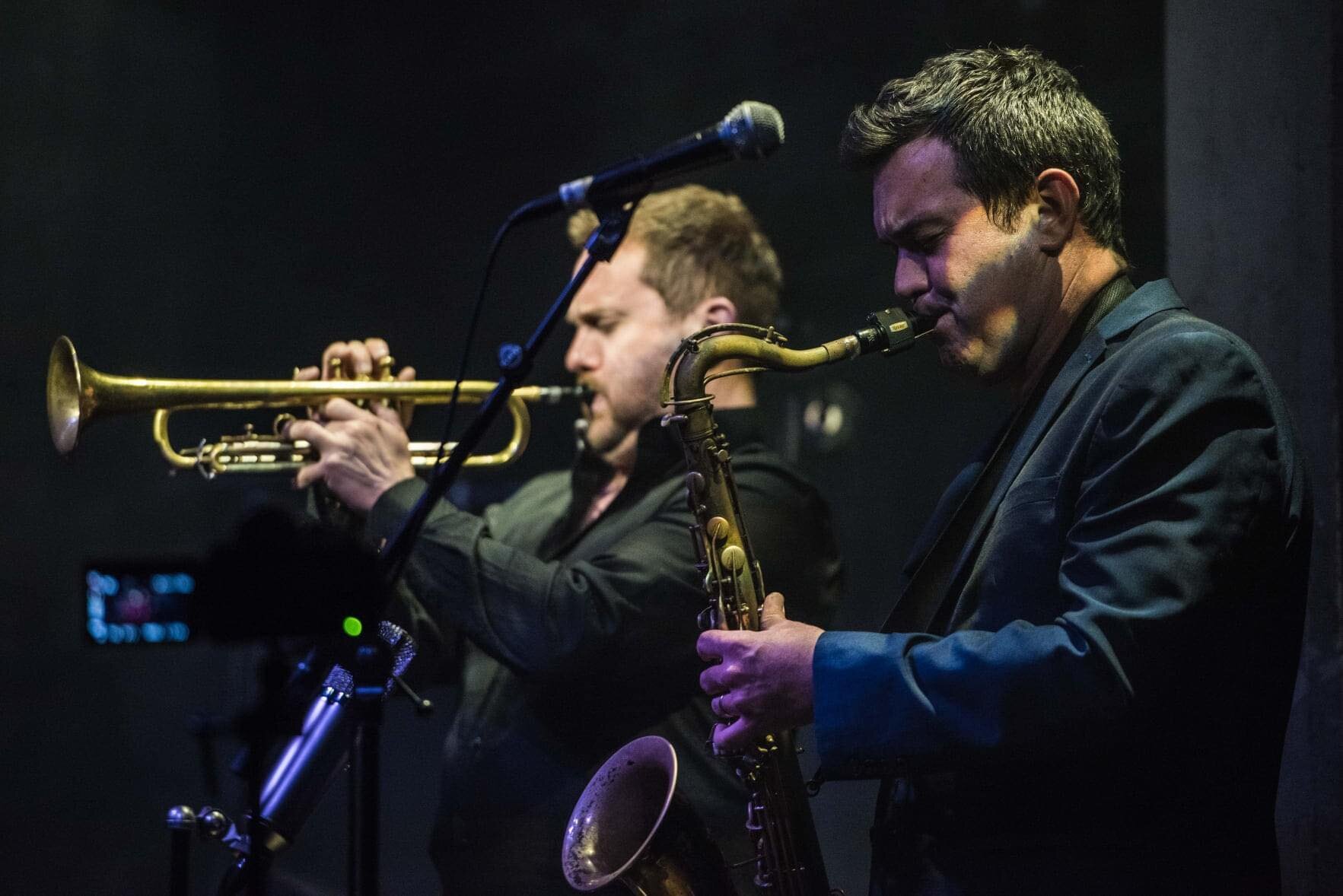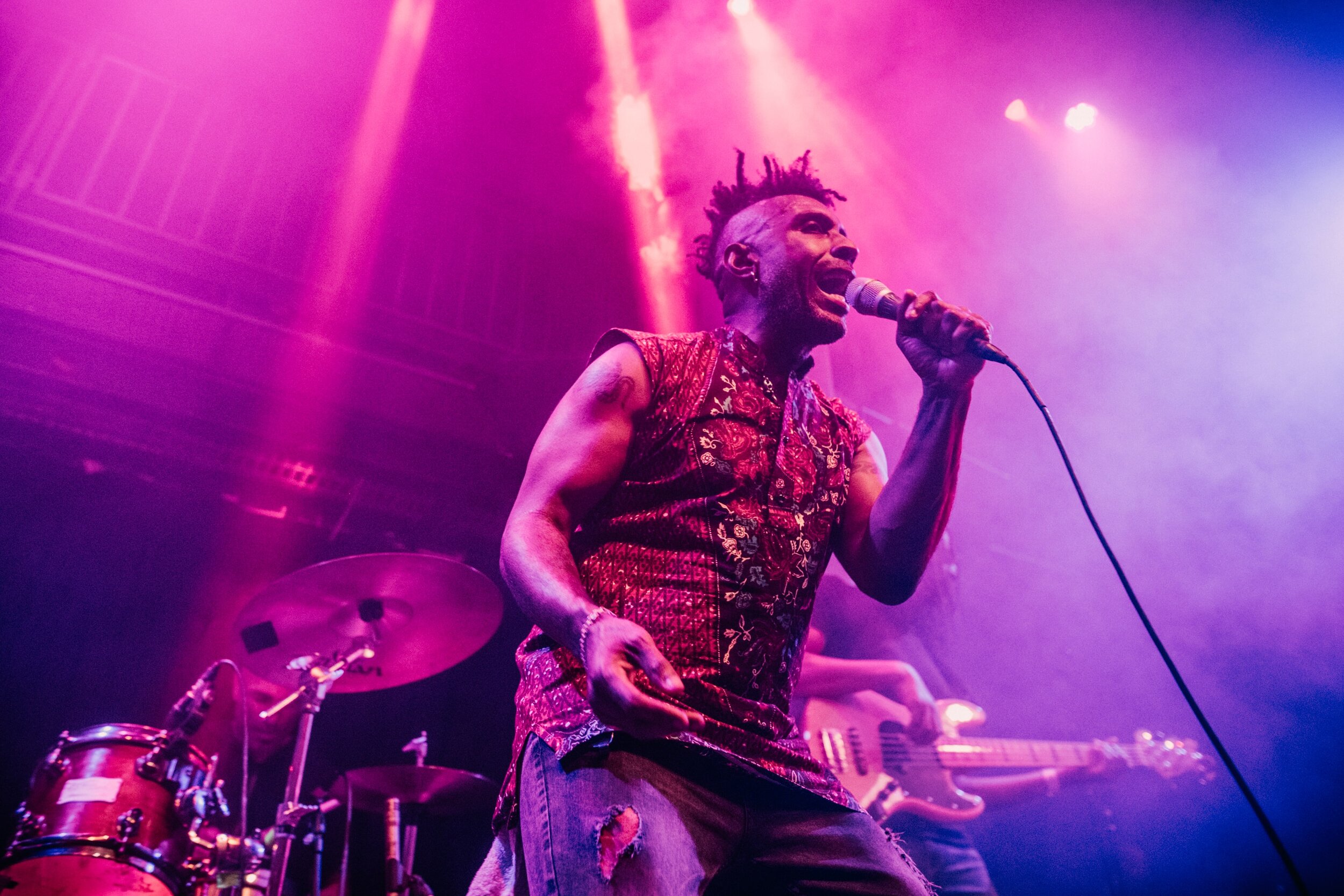Omar + QCBA 1st Single Dropped
REVIEW: Omar + QCBA
“All lovers of black music history lift every voice and sing.”
Photographer: Monika S Jakubowska
Omar + QCBA Live Review
Jazz Café, London [Mar 31, 2022]
The launch of an album that was recorded right here last year. In short, the live of the live, which we might market as surreal soul, a thing that would suit the likes of Omar + QCBA very well. After all, the former, known only too well to Echoes readers, has always undertaken flights of fancy in his 30-year career, such as that mesmerizing solo body slap rhythm-a-ning that was also done at this very venue when he was a yoot, not to mention his unique way of synthesizing dub, Afro-Latin, electronica and rhythm & blues in the mould of Stevie, Donny et al. Trumpeter Quentin Collins and tenor saxophonist-flautist Brandon Allen are the high grade jazz quartet who collaborate with him on Live At Last [riff on the title at your pleasure] and they are everything he could have hoped for to give his repertoire the richness associated with his aforementioned sources of inspiration. The horns reign supreme on classics such as ‘The Man’, ‘Stop War, Make Love’ and ‘Syleste’, providing shifting colours and textures that enhance a tone as distinctive as Omar’s. Then again, drummer Ian Thomas, depping for James Maddren, is funkily on point and organist Ross Stanley holds down the bass and treble quite magnificently - and also excels with Omar on a heavenly duet of ‘Nature Boy’, which ends with the gothic-horror-jump-scare of Bach’s ‘Toccata And Fugue In D Minor.’ Which is not quite what Nat ‘King’ Cole did back in the day. In any case, all lovers of black music history lift every voice and sing to the finale of ‘Be Thankful For What You’ve Got’, where the band was also joined by the hugely impressive young singer Cherise [who is more than likely to move from support act to headliner in the fullness of time].
Kevin Le Gendre
LIVE REVIEW: CAMILLA GEORGE
Camilla’s Jazz Café show was a real success, as reviewed by Marlbank’s Stephen Graham.
Winston Clifford was on stage the most senior player of all and gave a certain gravitas to the groove. Clifford you'll know from his work with Orphy Robinson on the vibes great's Blue Note 1990s album The Vibes Described for instance and on the Birmingham jazz icon saxist Andy Hamilton's Jamaica By Night to name but a few.
Ibio-Ibio is about Camilla's tribe from south-eastern coastal Nigeria, a certain walking with the spirits, with one piece themed around a shrine and musically steering a path that cut interestingly across bebop, sheer groove and Afrobeat stylings. On bass guitar Daniel Casimir was one of the stand-out players, even Bernard Edwards-like in one passage (no mean feat). George's band featured a guest kora player Kadialy Kouyate who came on with the horn players trombonist Nathaniel Cross and Sheila Maurice-Grey on trumpet from Kokoroko who was superb breaking free. Bookended with 'Intro' and 'Outro' the band sound was flavoured by the Grant Green-influenced nattily behatted Artie Zaitz known for his work with Moses Boyd's band Exodus. As usual he was a sizzling presence in the rhythm section.
Camilla mentioned in a brief chat to marlbank before the gig that Jazz Jamaica will be back on the road in July with dates doing Trojan material including at the Royal Festival Hall. So put 18 July in your diary for now. Watch out too for the build-up when it begins in due course to Ibio Ibio because the scintillating sounds heard here (especially the 'God of Heaven' and 'God of Earth' pieces) augur well. SG
Winston Clifford was on stage the most senior player of all and gave a certain gravitas to the groove. Clifford you'll know from his work with Orphy Robinson on the vibes great's Blue Note 1990s album The Vibes Described for instance and on the Birmingham jazz icon saxist Andy Hamilton's Jamaica By Night to name but a few.
Ibio-Ibio is about Camilla's tribe from south-eastern coastal Nigeria, a certain walking with the spirits, with one piece themed around a shrine and musically steering a path that cut interestingly across bebop, sheer groove and Afrobeat stylings. On bass guitar Daniel Casimir was one of the stand-out players, even Bernard Edwards-like in one passage (no mean feat). George's band featured a guest kora player Kadialy Kouyate who came on with the horn players trombonist Nathaniel Cross and Sheila Maurice-Grey on trumpet from Kokoroko who was superb breaking free. Bookended with 'Intro' and 'Outro' the band sound was flavoured by the Grant Green-influenced nattily behatted Artie Zaitz known for his work with Moses Boyd's band Exodus. As usual he was a sizzling presence in the rhythm section.
Camilla mentioned in a brief chat to marlbank before the gig that Jazz Jamaica will be back on the road in July with dates doing Trojan material including at the Royal Festival Hall. So put 18 July in your diary for now. Watch out too for the build-up when it begins in due course to Ibio Ibio because the scintillating sounds heard here (especially the 'God of Heaven' and 'God of Earth' pieces) augur well. SG
LIVE REVIEW: OMAR AND QCBA BOOGIE BACK TO CAMDEN’S REOPENED JAZZ CAFÉ
Jazzwise’s Kevin Le Gendre writes, “The south London jazz vocal don hits home with some uplifting spiritual soul-food.”
Reopened but with the novelty of distanced tables in its large standing space, one of London’s premier venues takes baby steps towards a post-covid world. This is precisely the kind of gig that is medicinal in every sense of the term. British soul legend Omar has long made music that can lift the spirits as well as impress with its ingenuity, and his meeting with a grade-A jazz quartet co-led by trumpeter Quentin Collins and saxophonist Brandon Allen provides a welcome opportunity to appreciate that. The fact that the set exclusively comprises Omar material written over a thirty-year period makes a strong case for him as a notable original composer as well as a man with a stellar voice. Casting his melodies against a largely acoustic backdrop actually highlights the richness of Omar’s phrasing, with Allen’s rapier flute doubling the second half of couplets and Collins’s lyrical brass floating in tight counterpoint.
Favourites such as ‘The Man’ have a notably lithe swing and a gospel holler thanks to the simmering chords of Ross Stanley’s Hammond organ, though ‘Essensual’ reminds us that Afro-Latin rhythms are a major component of Omar’s music, as befits his longstanding affinity to legends Stevie Wonder and Donny Hathaway. Yet there is a substantial amount of space afforded the band, culminating in an explosive interlude in which drummer James Maddren inventively breaks up a hitherto steady beat and Allen and Collins launch into raucous solos that raise the temperature in the room before everybody settles back down and Omar returns to the familiar ground of pieces such as ‘Syleste’. This deliciously lithe bossa nova is a highlight of his repertoire, and in tonight’s guise the original bass clarinet riff is covered by Allen pushing his low notes to the burr of a baritone.
Omar brings customary light and shade to the table, with that all-important falsetto as silken as it ever has been, but he also feeds off the energy of the soloists. On the coda of this and other songs he launches into lengthy scat solos that underline the entwinement of jazz and soul that places the likes of John Hendricks, Marvin Gaye and George Benson in one lineage. Omar has his own place in that, above all because the texture of his voice lies in a thought-provoking space between Black Britain, the Caribbean and Black America. He breaks boundaries.
Omar’s stream of wordless sounds, some throaty and rugged, some airy and refined, brings to mind the singer in his youth, playing a ‘body rhythm’ in which tightly co-ordinated vocal riffs and chest slaps call forth the spirit of a one man barbershop band. As a multi-instrumentalist who has always had an ear for timbres off the beaten track Omar was most probably intrigued by the sight of Alina Bzhezhinska combining solo harp and laptop beats in the first half of the evening, and he also regularly plays synthesizer to produce an additional overlay of rakish funk that gels with the horns.
Anyway, when things slow right down for the mandatory take on his signature tune, ‘There’s Nothing Like This’ Omar is also astute enough to rein in and let the beauty of the theme speak for itself. Everybody singing along knows this all too well, a wave of nostalgia washing away the misery of a pandemic that has not quite left the scene.
Omar + QCBA – Live at the Jazz Café
LondonJazz News’ Lavender Sutton writes, “"The audience would agree that there’s ‘nothing like this’ – but in case you missed it, watch out for the album release on Ubuntu Music."
Omar + QCBA
(Live at The Jazz Café. Also recorded for future release as a live album. 29 May 2021. Review by Lavender Sutton)
Omar + QCBA @ Jazz Café: 29.05.2021
Ubuntu Music recorded two sold out shows for a planned release of a live album!
Omar
Omar + QCBA
Quentin Collins and Brandon Allen
Ross Stanley
James Maddren
Omar
Ubuntu Music Signs Soul Sensation Omar + QCBA for Live Album Release
Omar + QCBA: Live at Jazz Café
UBU0100 / CD & Digital Formats
Ubuntu Music is delighted to announce the signing of sensational soul vocalist Omar + QCBA for the release of their upcoming live album, which is being recorded at their two sold out shows at London’s Jazz Café on Friday, 29th May.
Omar Lye-Fook MBE is, without a doubt, one of the greatest soul music talents the United Kingdom has produced in the last 40 years. If anyone has doubts about that, then they should consider the list of legendary artists who happily line up to collaborate with him musically, or simply sing his praises – from Stevie Wonder, the late Leon Ware, Erykah Badu, Common, through to Carleen Anderson, D’Angelo, and Soul II Soul’s Caron Wheeler, Angie Stone and UK artists Courtney Pine, Rodney P, Kele LeRoc, Natasha Watts and Estelle, who all appreciate his truly original and unique voice, his musicianship and his songwriting talent.
Omar teams up with his decade-long partnership of QCBA, featuring the outstanding trumpet player Quentin Collins and the tenor sax titan Brandon Allen, for an intoxicating musical cocktail of jazz, R&B, funk and soul.
QCBA are an organ driven quartet of virtuosos known for their smart, sassy, contemporary and original music. Influenced by the great Blue Note era of the 60s, they’ve taken the jazz scene by storm with their eclectic collaborations. When QCBA team up with Omar, they deliver an explosion of soul-funk infused music.
QCBA, left to right: Quentin Collins, Brandon Allen, Ross Stanley, James Maddren (screen edits)
Rounding out the band are two absolutely exceptional talents: Ross Stanley, arguably the best Hammond organist in the country, and James Maddren, certainly one of the most sought-after drummers in jazz today.
Commenting on the upcoming project, Omar shared his thoughts: “I’m very excited to extend my collaboration with these great jazz musicians onto a live recording and share this fresh approach to my music with my fans.”
Quentin Collins continued, saying: “"I'm excited to have this opportunity to further develop my longstanding musical relationships with both Omar and Ubuntu Music. For so long now I've been a huge admirer of both Omar's incredible voice as well as his unique song writing style. Having collaborated together for over 10 years, it makes a lot of sense to put down on record QCBA's arrangements of some of Omar’s great songs."
Brandon Allen also chimed in: “The chemistry between Omar and our group has always been very strong. Omar’s distinctive style, combined with our original arrangements of his music, creates something quite unique, which is a blend of soul/funk and the blue note jazz sound. I’m really looking forward to being part of this special performance and live recording.”
Martin Hummel, Director of Ubuntu Music, adds his perspective: “This album was destined to happen. All of the musicians on this upcoming recording have appeared on Ubuntu Music releases. Omar was a special guest on Camilla George’s last album. Quentin was my original partner in starting the Label and, along with Brandon, released the last QCBA album with Ubuntu. Ross was on this same QCBA release and also features on Nigel Price’s latest. And James was the pivotal drummer on our Martin Speake/Ethan Iverson album, as well as Calum Gourlay’s release. Omar + QCBA was made for a live recording, as anyone who has ever seen this band perform would wholeheartedly agree. They create a highly unique kind excitement and energy at the highest level. We are thrilled to be releasing this album, for everyone to enjoy. We welcome them to our beautiful Family.”
For further information, please contact:
Martin Hummel (Ubuntu Music) martin@ubuntumanagementgroup.com
JOE DOWNARD AND JAMES COPUS – THE DYNAMIC DUO REBOOT JAZZ CAFE LIVE PERFORMANCES
Jazzwise’s James Rybacki writes, “All in all, it’s both a triumphant return to live music and a chance for Ubuntu Music to show off some of the exquisite talent they’ve got on the roster.”
A return, at last, to live jazz and all that comes with it. The frenetic improvisation of top-drawer players spurred on by an enraptured crowd, the electric charge that ripples around the room as a wicked chord change throws you, a blue note cuts through, and the band brings it all together to rise to a crescendo.
Onstage in Camden Town’s newly socially distanced Jazz Cafe, the relief from the artists is almost palpable. They’re back to doing what they love, and playing with a renewed passion and zest - you don’t know what you’ve got until it’s gone.
Launching his album Seven Japanese Tales after what must have been an agonising and uncertain wait, Joe Downard wields his upright bass with downright intensity, steering his band adroitly through seven lush and long pieces. Leading the attack, Alex Hitchcock and James Copus’s respective saxophone and trumpet play off each other magnificently, intertwining with invention and restlessly sparring.
The rhythm players come into their own on songs like ‘Terror’, where a driving and busy opening gives way to a more pensive and meandering middle section. Later in the set, the tense chords at the start of ‘The Thief’ are even more awesomely jarring in person than they are on the record. There, they are exquisitely dissonant. Here, they almost strike fear in the best way possible.
James Copus starts his set with new material, a languid groove that lays the foundation for the set and showcases the trumpeter’s evident chops. Copus’s material from his album ‘Dusk’ has a more electronic feel for the live set, with an electric bass and Fender Rhodes sound changing up the musical soundscape. The keys playing enters more synthy territory at times, getting very glitchy and outside, spiraling chaotically before coming back in line. All in all, it’s both a triumphant return to live music and a chance for Ubuntu Music to show off some of the exquisite talent they’ve got on the roster. “We’re taking over London,” co-founder Martin Hummel tells me between sets, “come with us!” Gladly.





































